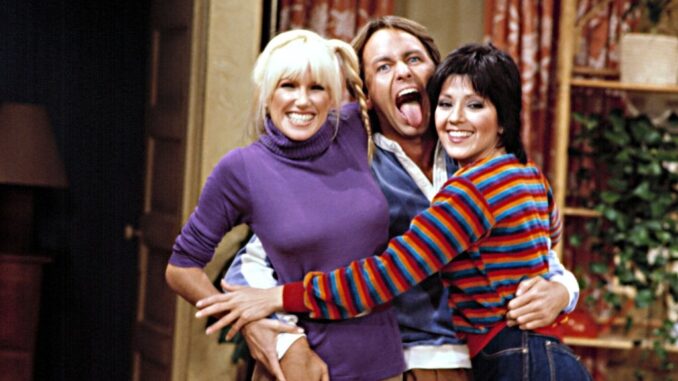
Introduction
Three’s Company is a beloved sitcom that has been entertaining audiences for decades. However, beneath its surface of quirky humor and slapstick comedy lies a darker, more unsettling undercurrent. While the show is often remembered for its lighthearted tone and physical comedy, there are several elements that, upon closer examination, reveal a more sinister side.
The Uncomfortable Premise
At its core, Three’s Company is a show about a young man, Jack Tripper, who poses as a gay man to live with two attractive women, Janet Wood and Chrissy Snow. This premise alone raises some eyebrows. It’s a bit odd to think about a man pretending to be gay to live with two women, especially considering the societal attitudes of the time.
The Constant Pursuit of Romance
While the show often plays these romantic pursuits for laughs, they can also be seen as a bit creepy and obsessive. Jack’s constant scheming to win Janet’s heart, and the way he often invades her personal space, can be interpreted as borderline stalker behavior.
The Lack of Consent
One of the most unsettling aspects of the show is the lack of explicit consent in many of the romantic situations. Characters often find themselves in compromising positions without explicitly agreeing to them. This can be seen as a reflection of societal attitudes towards sexuality and consent at the time.
The Fetishisation of Female Bodies
The show often fetishizes female bodies, reducing women to mere objects of desire. The constant focus on physical appearance and the objectification of women can be seen as problematic, especially in today’s more enlightened times.
The Homophobic Undertones
While the show was groundbreaking for its time in terms of tackling issues of sexuality and gender roles, it also relied on homophobic stereotypes and jokes. This can be seen as both insensitive and harmful.
The Unrealistic Expectations of Relationships
Three’s Company often portrays relationships as chaotic, messy, and full of misunderstandings. While this can be funny, it can also set unrealistic expectations for real-life relationships.
Conclusion
While Three’s Company remains a beloved sitcom, it’s important to acknowledge its darker undertones. By recognizing these flaws, we can appreciate the show for what it is while also acknowledging the social and cultural context in which it was created.
FAQs
- Why is Three’s Company considered controversial?
- Three’s Company is controversial due to its premise, which involves a man pretending to be gay to live with two women, as well as its often problematic portrayal of relationships, sexuality, and gender roles.
- What are some of the problematic tropes in Three’s Company?
- Some problematic tropes in Three’s Company include the fetishization of female bodies, the lack of explicit consent, and the use of homophobic stereotypes.
- How does Three’s Company reflect societal attitudes of the time?
- Three’s Company reflects the societal attitudes of the 1970s and 1980s, particularly in terms of gender roles, sexuality, and relationships.
- Is Three’s Company still relevant today?
- While Three’s Company remains a nostalgic favorite, its outdated and problematic elements make it less relevant to modern audiences.
- What lessons can we learn from Three’s Company?
- Three’s Company can teach us about the importance of consent, respect, and healthy relationships. It also highlights the need to be mindful of the potential negative impacts of media on our perceptions and behaviors.
